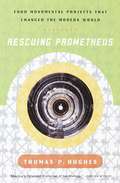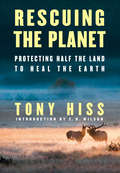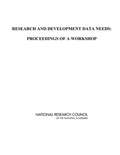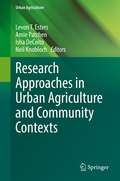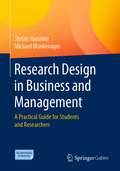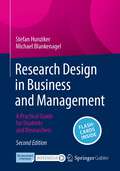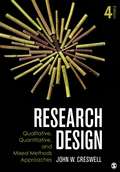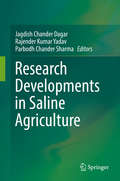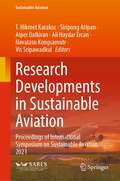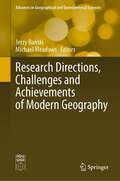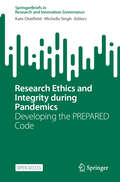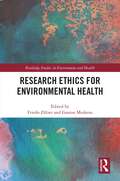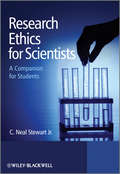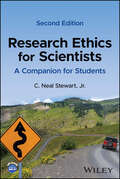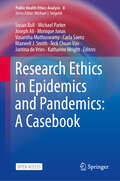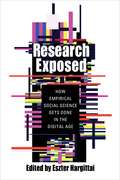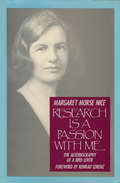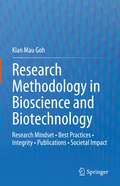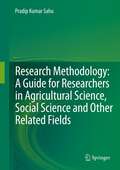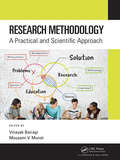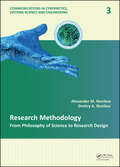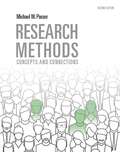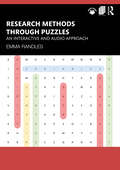- Table View
- List View
Rescuing Prometheus: Four Monumental Projects that Changed Our World
by Thomas P. Hughes"A rare insight into industrial planning on a huge scale...Excellent." --The EconomistRescuing Prometheus is an eye-opening and marvelously informative look at some of the technological projects that helped shape the modern world. Thomas P. Hughes focuses on four postwar projects whose vastness and complexity inspired new technology, new organizations, and new management styles. The first use of computers to run systems was developed for the SAGE air defense project. The Atlas missile project was so complicated it required the development of systems engineering in order to complete it. The Boston Central Artery/Tunnel Project tested systems engineering in the complex crucible of a large scale civilian roadway. And finally, the origins of the Internet fostered the collegial management style that later would take over Silicon Valley and define the modern computer industry. With keen insight, Hughes tells these fascinating stories while providing a riveting history of modern technology and the management systems that made it possible.From the Trade Paperback edition.
Rescuing the Planet: Protecting Half the Land to Heal the Earth
by Tony Hiss"As clear a picture of humanity's impact on earth's natural environment as any ever written." --E. O. Wilson (from the Introduction)An urgent, resounding call to protect 50 percent of the earth's land by 2050--thereby saving millions of its species--and a candid assessment of the health of our planet and our role in conserving it, from the award-winning author of The Experience of Place and veteran New Yorker staff writer.Beginning in the vast North American Boreal Forest that stretches through Canada, and roving across the continent, from the Northern Sierra to Alabama's Paint Rock Forest, from the Appalachian Trail to a ranch in Mexico, Tony Hiss sets out on a journey to take stock of the "superorganism" that is the earth: its land, its elements, its plants and animals, its greatest threats--and what we can do to keep it, and ourselves, alive.Hiss not only invites us to understand the scope and gravity of the problems we face, but also makes the case for why protecting half the land is the way to fix those problems. He highlights the important work of the many groups already involved in this fight, such as the Indigenous Leadership Initiative, the Yellowstone to Yukon Conservation Initiative, and the global animal tracking project ICARUS. And he introduces us to the engineers, geologists, biologists, botanists, oceanographers, ecologists, and other "Half Earthers" like Hiss himself who are allied in their dedication to the unifying, essential cause of saving our own planet from ourselves.Tender, impassioned, curious, and above all else inspiring, Rescuing the Planet is a work that promises to make all of us better citizens of the earth.
Research And Development Data Needs: Proceedings Of A Workshop
by National Research Council of the National AcademiesThis report contains the proceedings of a one-day workshop organized by the National Research Council’s Board on Science, Technology, and Economic Policy (STEP), in conjunction with a study by a panel of the NRC Committee on National Statistics (CNSTAT). This combined activity was commissioned by the Science Resources Statistics Division (SRS) of the National Science Foundation (NSF) to recommend improvements in the Foundation’s portfolio of surveys of research and development spending by the federal government, state governments, private industry, the nation’s universities and colleges, and other nonprofit institutions.
Research Approaches in Urban Agriculture and Community Contexts (Urban Agriculture)
by Levon T. Esters Amie Patchen Isha DeCoito Neil KnoblochThis book will fill a void in the literature around research and program design and the impact of such experiences on learning outcomes within urban agricultural contexts. In particular, this book will cover topics such as STEM integration, science learning, student engagement, learning gardens and curriculum design.
Research Design in Business and Management: A Practical Guide for Students and Researchers
by Stefan Hunziker Michael BlankenagelThe present book project on Research Design, which is planned in English, is intended to create an innovative textbook that can be used at university undergraduate and graduate levels in internationally oriented education in the German-speaking countries. This textbook shall provide comprehensive guidance for students when tackling their (applied) research papers. Instead of reiterating qualitative and quantitative methods it focuses on how to come up with an appropriate research design that allows the student to make the intended intellectual contribution. Starting from the desired (hypothetical) conclusion or statement the student will be guided through the process of finding the appropriate Research Question that will be answered by such a statement and the required Research Design consisting of data collection and data analysis, that allows for such a statement as the conclusion of the study. Common Research Designs in Business and Management, i.e. well beyond the standard Research Designs of Social Sciences and curtailed to the focus area, will be described with regard to their suitability to answer specific kinds of questions as well as the idiosyncrasies of the these Designs and their impact on the written research reports. Examples for each Research Design will be provided as well as guidance about how to write about such research.
Research Design in Business and Management: A Practical Guide for Students and Researchers
by Stefan Hunziker Michael BlankenagelThis textbook on research designs provides undergraduate and graduate students with detailed guidance to tackle their research projects. It has been recommended and developed for university courses in Germany, Austria, and Switzerland. The authors offer students relevant research designs in business and management. They show how to overcome the common qualitative and quantitative methods divide. For this purpose, the textbook focuses on the scientific problem-solving process. It emphasizes the importance of an appropriate research design to produce intellectual contributions. The authors describe the most relevant research designs in business and management research. They assess each research design about its suitability to answer specific research questions. The textbook also covers academic writing and provides valuable tips about the whole research process. It not only serves students as a resource to conduct their research projects. Moreover, it is also a helpful reference throughout the entire academic career.
Research Design: Qualitative, Quantitative, And Mixed Methods Approaches (Fourth Edition)
by John W. CreswellThe eagerly anticipated Fourth Edition of the title that pioneered the comparison of qualitative, quantitative, and mixed methods research design is here! For all three approaches, Creswell includes a preliminary consideration of philosophical assumptions, a review of the literature, an assessment of the use of theory in research approaches, and reflections about the importance of writing and ethics in scholarly inquiry. He also presents the key elements of the research process, giving specific attention to each approach. The Fourth Edition includes extensively revised mixed methods coverage, increased coverage of ethical issues in research, and an expanded emphasis on worldview perspectives.
Research Design: Qualitative, Quantitative, and Mixed Methods Approaches (Fourth Edition)
by John W. CreswellThe eagerly anticipated Fourth Edition of the title that pioneered the comparison of qualitative, quantitative, and mixed methods research design is here! For all three approaches, Creswell includes a preliminary consideration of philosophical assumptions, a review of the literature, an assessment of the use of theory in research approaches, and refl ections about the importance of writing and ethics in scholarly inquiry. He also presents the key elements of the research process, giving specifi c attention to each approach. The Fourth Edition includes extensively revised mixed methods coverage, increased coverage of ethical issues in research, and an expanded emphasis on worldview perspectives.
Research Developments in Saline Agriculture
by Jagdish Chander Dagar Rajender Kumar Yadav Parbodh Chander SharmaSoil and water salinity is a major challenge for the agricultural community and policy makers in terms of meeting the burgeoning population’s demand for food and other agricultural commodities. In coastal regions, climate change and sea level rise will aggravate the problem with more and more areas becoming saline due to intrusion of sea water. As such there is a pressing need for modern tools and innovative techniques for the identification of salty soils and poor-quality waters, crop production, soil reclamation and lowering the water table in waterlogged areas. Tackling next-generation problems such as contamination of soil and underground water due to fluoride and arsenic, as well as developing multi-stress tolerant crops is also a high priority. Further, techniques for domesticating halophytes, mangrove-based aquacultures, using seaweed cultures as agricultural crops and integrated farming systems need to be perfected. This book addresses all these aspects in detail, highlighting the diverse solutions to tackle the complex problem of salinity and waterlogging and safer management of poor-quality waters. With chapters written by leading experts, it is a valuable resource for researchers planning future investigations, policy makers, farmers and other stakeholders, and for students wanting insights into vital issues of environment.
Research Developments in Sustainable Aviation: Proceedings of International Symposium on Sustainable Aviation 2021 (Sustainable Aviation)
by T. Hikmet Karakoc Alper Dalkiran Ali Haydar Ercan Siripong Atipan Navatasn Kongsamutr Vis SripawadkulSustainable aviation is a long-term strategy aimed at providing innovative solutions to the challenges facing the aviation industry. The International Symposium on Sustainable Aviation is a multi-disciplinary symposium that presents research on current sustainability-based issues and future trends in the field of aviation from an economic, social, and environmental perspective. The conference provides a platform offering insights on a broad range of current issues in aviation, such as improving aircraft fuel efficiency, fostering the use of biofuels, minimizing environmental impact, mitigating GHG emissions, and reducing engine and airframe noise. ISSA allows researchers, scientists, engineers, practitioners, policymakers, and students to exchange information, present new technologies and developments, and discuss future direction, strategies, and priorities in aviation and sustainability.
Research Directions, Challenges and Achievements of Modern Geography (Advances in Geographical and Environmental Sciences)
by Michael Meadows Jerzy BańskiThis book identifies and discusses research directions, challenges and achievements in contemporary geography. It also documents the most current theoretical and methodological considerations undertaken by scientists representing various sub-disciplines of geography with particular reference to human geography. It was assumed that the thematic structure of the currently active International Geographical Union (IGU) problem commissions corresponds to the most relevant and current research directions in geography. Reflecting this assumption, the book consists of 14 chapters contributed by geographers representing 14 problem commissions of the IGU, which allows us to examine geography from different perspectives and to provide the reader with a complete overview of contemporary research issues in human geography. The first part discusses contemporary research problems and issues related to scientific methodology and achievements of selected geographical sub-disciplines, including urban geography, agricultural geography, transport geography, and political geography, among others. The second part focuses on the interdisciplinarity of geography and the topics of global dimension undertaken by geographers such as global change, GIS and geospatial technology, marginalization, and environmental change. This part also discusses the internal relations between geographical specializations and their links with other related sciences, including geology, sociology, and economics. The third part discusses the holistic approaches of geography applied to particular regions, territories, or conditions (Africa, costal systems, geomorphology and local development).
Research Ethics and Integrity During Pandemics: Developing the PREPARED Code (SpringerBriefs in Research and Innovation Governance)
by Kate Chatfield Michelle SinghThis open-access book is an essential read for anyone interested in pandemic preparedness, research governance, and the ethical oversight of research. It examines the development of a pioneering research ethics framework designed for use during pandemics, guiding readers through the careful development of the PREPARED Code, while highlighting the key steps and lessons learned. The book also underscores the importance of supportive measures, such as user-friendly ethics training, to ensure effective implementation. Drawing from these insights, it offers recommendations for others seeking to develop their own clear, engaging, and accessible ethics code.
Research Ethics for Environmental Health (Routledge Studies in Environment and Health)
by Friedo ZölzerResearch Ethics for Environmental Health explores the ethical basis of environmental health research and related aspects of risk assessment and control. Environmental health encompasses the assessment and control of those environmental factors that can potentially affect human health, such as radiation, toxic chemicals and other hazardous agents. It is often assumed that the assessment part is just a matter of scientific research, and that control is a matter of implementing standards that unambiguously follow from that research. But it is less commonly understood that environmental health also requires addressing questions of an ethical nature. Coming from multiple disciplines and nine different countries, the contributors to this book critically examine a diverse range of ethical concerns in modern environmental health research. This book will be of great interest to scholars and practitioners of environmental health, as well as researchers in applied ethics, environmental ethics, medical ethics, bioethics and those concerned with chemical and radiation protection.
Research Ethics for Scientists
by C. Neal Stewart Jr.Research Ethics for Scientists is about best practices in all the major areas of research management and practice that are common to scientific researchers, especially those in academia. Aimed towards the younger scientist, the book critically examines the key areas that continue to plague even experienced and well-meaning science professionals.For ease of use, the book is arranged in functional themes and units that every scientist recognizes as crucial for sustained success in science; ideas, people, data, publications and funding. These key themes will help to highlight the elements of successful and ethical research as well as challenging the reader to develop their own ideas of how to conduct themselves within their work.Tackles the ethical issues of being a scientist rather than the ethical questions raised by science itselfCase studies used for a practical approach Written by an experienced researcher and PhD mentor Accessible, user-friendly advice Indispensible companion for students and young scientists
Research Ethics for Scientists: A Companion for Students
by C. Neal Stewart Jr.A fully updated textbook helping advanced students and young scientists navigate the ethical challenges that are common to scientific researchers in academia As the number of scientific journals, government regulations, and institutional guidelines continue to grow, research scientists are increasingly facing ethical dilemmas. Even seasoned and honest scientists can unintentionally commit research misconduct or fail to detect and address intentional misbehavior. Research Ethics for Scientists is an authoritative “how-to” guide that clearly outlines best practices in scientific research. Critically examining the key problems that arise in research management and practice, this real-world handbook helps students and young scientists conduct scientific research that adheres to the highest ethical standards. Accessible chapters, logically organized into functional themes and units, cover all the major areas that are crucial for sustained success in science: ideas, people, data, publications, and funding. The second edition offers new and updated content throughout, including discussions of recent innovations to detect and adjudicate research misconduct, vulnerabilities in research practices that were exposed by the COVID-19 pandemic, and new methods people are using to cheat the system and skew the peer review process. Entirely new case studies focus on harassment and bullying in training and mentorship, anti-science and pseudoscience, equality and equity issues, the fabrication of data, and more. This edition integrates gender, race, student training, and other important social issues throughout. Presents up-to-date coverage of growing issues such as the ethics of rushing to publish Discusses the use of text-similarity detecting software to reveal plagiarism and image analysis techniques for detecting data and image manipulation Features new material on current trends such as universal open access (OA) publishing, increased research metrics, new models for peer review, working for multiple employers, and “shadow labs” for individual scientists Includes access to a companion website with PowerPoint slides of case studies and figures Written by an experienced researcher and PhD mentor, Research Ethics for Scientists: A Companion for Students, Second Edition is an indispensable resource for graduate students, postdoctoral researchers, early-career professors, and scientists involved in teaching scientists-in-training.
Research Ethics in Epidemics and Pandemics: A Casebook (Public Health Ethics Analysis #8)
by Michael Parker Susan Bull Carla Saenz Vasantha Muthuswamy Joseph Ali Monique Jonas Maxwell J. Smith Teck Chuan Voo Jantina De Vries Katharine WrightThis open access casebook addresses complex and important ethical challenges arising when health-related research in conducted in the context of epidemics and pandemics. This book provides contextually-rich real-world case studies illustrating research ethics issues encountered by researchers, ethics reviewers and regulators around the globe during the COVID-19 pandemic. The accompanying commentaries outline relevant conceptual approaches and ethical considerations. These promote understanding and reflection on relevant ethical issues, ethical approaches and competing considerations in a manner supporting thoughtful evaluation of their implications for practice. As such the casebook is relevant to academic and professional audiences with an interest in global health, research ethics, and outbreaks and epidemics.
Research Ethics:
by Gary ComstockEducation in the responsible conduct of research typically takes the form of online instructions about rules, regulations, and policies. Research Ethics takes a novel approach and emphasizes the art of philosophical decision-making. Part A introduces egoism and explains that it is in the individuals own interest to avoid misconduct, fabrication of data, plagiarism and bias. Part B explains contractualism and covers issues of authorship, peer review and responsible use of statistics. Part C introduces moral rights as the basis of informed consent, the use of humans in research, mentoring, intellectual property and conflicts of interests. Part D uses two-level utilitarianism to explore the possibilities and limits of the experimental use of animals, duties to the environment and future generations, and the social responsibilities of researchers. This book represents a fresh approach to research ethics. It will engage the moral imaginations of graduate students in all disciplines.
Research Exposed: How Empirical Social Science Gets Done in the Digital Age
by Eszter HargittaiThe era of digital communication provides endless opportunities for the collection and analysis of social data in novel ways. It also presents new and unanticipated challenges, as researchers are often inventing elements of their methodologies on the fly or studying a phenomenon or media platform for the first time.Research Exposed offers in-depth, behind-the-scenes accounts of doing empirical social science in this new paradigm. Through firsthand descriptions of innovative research projects, it shares lessons learned from over a dozen scholars’ cutting-edge work. These candid accounts describe what can go wrong when pioneering new genres of research and how such difficulties can be overcome, giving both big-picture reflection and actionable advice. The chapters discuss a variety of methods, ranging from the completely novel to the use of more traditional approaches in the digital context, and cover research questions relevant to a range of disciplines, including sociology, political science, communication, information studies, and anthropology.By focusing attention on the concrete details seldom discussed in final project write-ups or traditional research guides, Research Exposed helps equip junior and senior scholars alike with essential information that is all too often left with no outlet for sharing. It offers important insights into how empirical social science research can be both innovative and rigorous when dealing with the opportunities and challenges presented by digital media.
Research Is a Passion With Me: The Autobiography of a Bird Lover
by Konrad Lorenz Margaret Morse NiceIn her incredibly productive lifetime (1883-1974), American-born ornithologist Margaret Morse Nice earned the admiration of ornithologists and naturalists in far distant lands. Research Is a Passion With Me is an enthralling autobiography of one of the great individuals in her field and of her time. The prominent California nature writer, Donald Peattie, in commenting on Margaret Nice’s writing ability, stated: "Your art of telling is so good that it conceals how good the science is." And Professor Ernst Mayer of Harvard University said: "Margaret Nice was a remarkable person and only those who know the state of American ornithology when she started her work will appreciate her contribution." "An extraordinary bird watcher. Every summer she and her husband would gather the girls, pack their old car with camping gear, and head off into the wilds to look for new birds. This eccentric way of living was unusual in the early 1920s, but even their youngest daughter adjusted to it. Their older girls shinnied up trees to observe nests and helped in housekeeping tasks around the campsite."- Marcia Bonta, Bird Watcher’s Digest
Research Methodology in Bioscience and Biotechnology: Research Mindset • Best Practices • Integrity • Publications • Societal Impact
by Kian Mau GohThis monograph offers a comprehensive guide to good research practices and mindsets, covering a wide range of topics across 8 chapters. Readers will find numerous themes and strategies that can help them develop their research skills and achieve their objectives, from effective proposal writing to stress management and upskilling. This book explains the purpose, process, tips, and mistakes of writing proposals, theses, articles, and reviews in clear and straightforward language, allowing readers to develop good research plans. By applying the advice and insights offered in this book, students and researchers can improve the quality of their work, cultivate research integrity, and develop good publication plans, write well, and reduce rejection rates. Research outputs will be more likely to be of high quality if students and researchers are encouraged to cultivate these pieces of advice. The focus of the book is not solely on the outcomes of research. Rather, it also delves into mindset, habits, adaptability, time management, stress management, recent tools for upskilling, planning, and execution. Throughout the book, the author seeks to instill a growth mindset in the readers, encouraging them to develop positive research habits and behaviors. KPIs, particularly publications, shall not be used as a reason to erode research integrity and ethnicity; therefore, plagiarism, self-citation, falsifying data, exaggerating findings, authorship in publications, the use of AI tools, CRediT, and COPE are discussed. This book contains interviews with high-profile researchers, top management at institutions, policy advisers, etc., whose opinions and advice the readers will find valuable. Overall, this all-in-one guide is an essential resource for postgraduate students, post-doctoral fellows, and academics who are struggling to find a survival strategy in the rapidly changing research environment. The book assists readers in developing right mindset, planning their research and publications, and in achieving their predetermined objectives.
Research Methodology: A Guide for Researchers In Agricultural Science, Social Science and Other Related Fields
by Pradip Kumar SahuThis book is the outcome of more than 20 years of experience of the author in teaching and research field. The wider scope and coverage of the book will help not only the students/ researchers/professionals in the field of agriculture and allied disciplines, but also the researchers and practitioners in other fields. Written in simple and lucid language, the book would appeal to all those who are meant to be benefitted out of it. All efforts have been made to present "RESEARCH", its meaning, intention and usefulness. The book reflects current methodological techniques used in interdisciplinary research, as illustrated with many relevant worked out examples. Designing of research programme, selection of variables, collection of data and their analysis to interpret the data are discussed extensively. Statistical tools are complemented with real-life examples, making the otherwise complicated subject like statistics seem simpler. Attempts have been made to demonstrate how a user can solve the problems using simple computer-oriented programme. Emphasis is placed not only on solving the problems in various fields but also on drawing inferences from the problems. The importance of instruments and computers in research processes and statistical analyses along with their misuse/incorrect use is also discussed to make the user aware about the correct use of specific technique. In all the chapters, theories are combined with examples, and steps are enumerated to follow the correct use of the available packages like MSEXCELL, SPSS, SPAR1, SAS etc. Utmost care has been taken to present varied range of research problems along with their solutions in agriculture and allied fields which would be of immense use to readers.
Research Methodology: A Practical and Scientific Approach
by Vinayak Bairagi Mousami V. MunotThis book offers a design research methodology intended to improve the quality of design research- its academic credibility, industrial significance and societal contribution by enabling more thorough, efficient and effective procedures.
Research Methodology: From Philosophy of Science to Research Design (Communications in Cybernetics, Systems Science and Engineering #3)
by Dmitry A. Novikov Alexander M. NovikovResearch Methodology: From Philosophy of Science to Research Design distinguishes itself from many other works devoted to research methodology and the philosophy of science in its integrated approach towards scientific research, which is regarded as the scientific project on all levels from philosophy of science to research design. This work studie
Research Methods
by Michael W. PasserWith over two decades of classroom experience, Michael Passer knows how to guide students through the ins and outs of research methods in ways they can actually understand and put into practice. In this remarkable text, Passer’s experience leads to chapters filled with clear explanations, resonant examples, and contemporary research from across the breadth of modern psychology, all while anticipating common questions and misunderstandings.
Research Methods Through Puzzles: An Interactive and Audio Approach
by Emma RandlesDive into the world of research with this interactive puzzle book. Whether you're just starting out with research methods or looking to refresh your knowledge on the basics, this book offers a fun and engaging way to get to grips with everything research related. You'll explore key topics like variables, sampling methods, experimental design, reliability, and validity—plus so much more!With clear, easy-to-follow explanations, you’ll learn how to control variables, understand different types of data, develop hypotheses, ensure reliability and validity, and choose the right statistical tests. Each concept is paired with puzzles to help you consolidate what you’ve learned. And to make it even easier, each chapter has support material in the form of a helpful audio guide to walk you through the material.This book takes a conversational approach to make learning research methods feel less intimidating, and more enjoyable! Whether you're a student or just someone interested in research, this puzzle book turns learning research methods into an engaging and fun activity.
